-
Notifications
You must be signed in to change notification settings - Fork 0
Blocking Observable Operators
This section explains the BlockingObservable subclass. A Blocking Observable extends the ordinary Observable class by providing a set of operators on the items emitted by the Observable that block.
To transform an Observable into a BlockingObservable, use the Observable.toBlockingObservable( ) method or the BlockingObservable.from( ) method.
-
forEach( )— invoke a function on each item emitted by the Observable; block until the Observable completes -
last( )— block until the Observable completes, then return the last item emitted by the Observable -
lastOrDefault( )— block until the Observable completes, then return the last item emitted by the Observable or a default item if there is no last item -
mostRecent( )— returns an iterable that always returns the item most recently emitted by the Observable -
next( )— returns an iterable that blocks until the Observable emits another item, then returns that item -
single( )— if the Observable completes after emitting a single item, return that item, otherwise throw an exception -
singleOrDefault( )— if the Observable completes after emitting a single item, return that item, otherwise return a default item -
toFuture( )— convert the Observable into a Future -
toIterable( )— convert the sequence emitted by the Observable into an Iterable -
getIterator( )ortoIterator( )— convert the sequence emitted by the Observable into an Iterator
This documentation accompanies its explanations with a modified form of "marble diagrams." Here is how these marble diagrams represent Blocking Observables:

- javadoc:
BlockingObservable - javadoc:
toBlockingObservable() - javadoc:
BlockingObservable.from()
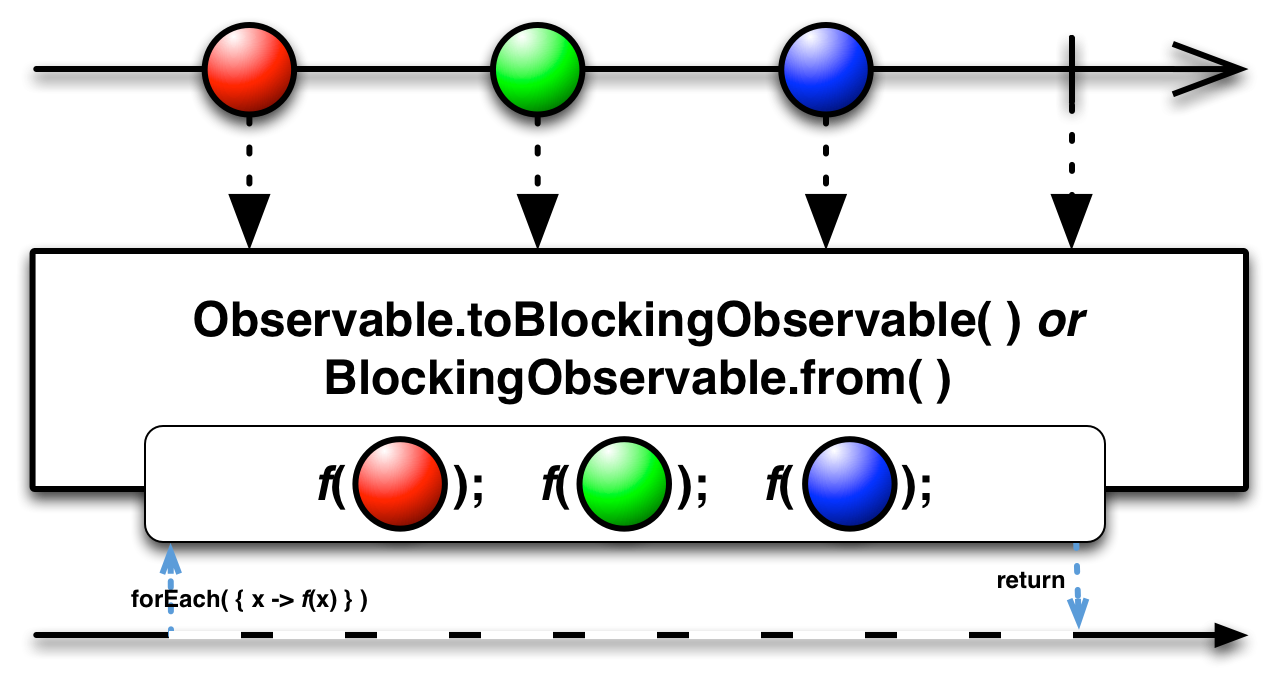 The
The forEach(someFunction) method is the blocking equivalent of subscribe(someFunction). When you pass a function to this method, forEach( ) will invoke your function for each item emitted by the Observable, but will only return control to you once the Observable completes (it will not otherwise indicate that the Observable has completed; there is no forEach( ) equivalent of the onError or onCompleted methods).
- javadoc:
forEach(action) - Linq:
ForEach - Introduction to Rx: ForEach
 Use the
Use the last( ) method to retrieve the last item emitted by an Observable, at the time the Observable completes (or null if the Observable emitted no items before completing).
You can also use this method to retrieve the last item emitted by an Observable that meets some particular condition (or null if the Observable method emits no such items). To do this, pass a function to last( ) that returns true if the item meets the condition.

Note that because last( ) emits null to indicate that no item (or no matching item) was emitted by the underlying Observable, this creates an ambiguity in the case of Observables whose last emitted item (or matching item) is null:
def boNull = Observable.from([null]).toBlockingObservable();
def boNothing = Observable.from([]).toBlockingObservable();
println('boNull.last(): ' + boNull.last());
println('boNothing.last(): ' + boNothing.last());boNull.last(): null
boNothing.last(): null
The lastOrDefault( ) method is similar to last( ), except that instead of returning null when there is no last item (or no last item that meets the specified condition), in such a case it will instead return a default item that you specify. Specify that default item by passing it as the first parameter to lastOrDefault( ).


Note that you can use this to guard against the ambiguous-null noted above:
def boNull = Observable.from([null]).toBlockingObservable();
def boNothing = Observable.from([]).toBlockingObservable();
println('boNull.lastOrDefault("foo"): ' + boNull.lastOrDefault("foo"));
println('boNothing.lastOrDefault("foo"): ' + boNothing.lastOrDefault("foo"));boNull.lastOrDefault("foo"): null
boNothing.lastOrDefault("foo"): foo
- javadoc:
last() - javadoc:
last(predicate) - javadoc:
lastOrDefault(default) - javadoc:
lastOrDefault(default, predicate) - RxJS:
last - RxJS:
lastOrDefault - Linq:
Last - Linq:
LastOrDefault - Introduction to Rx: Last
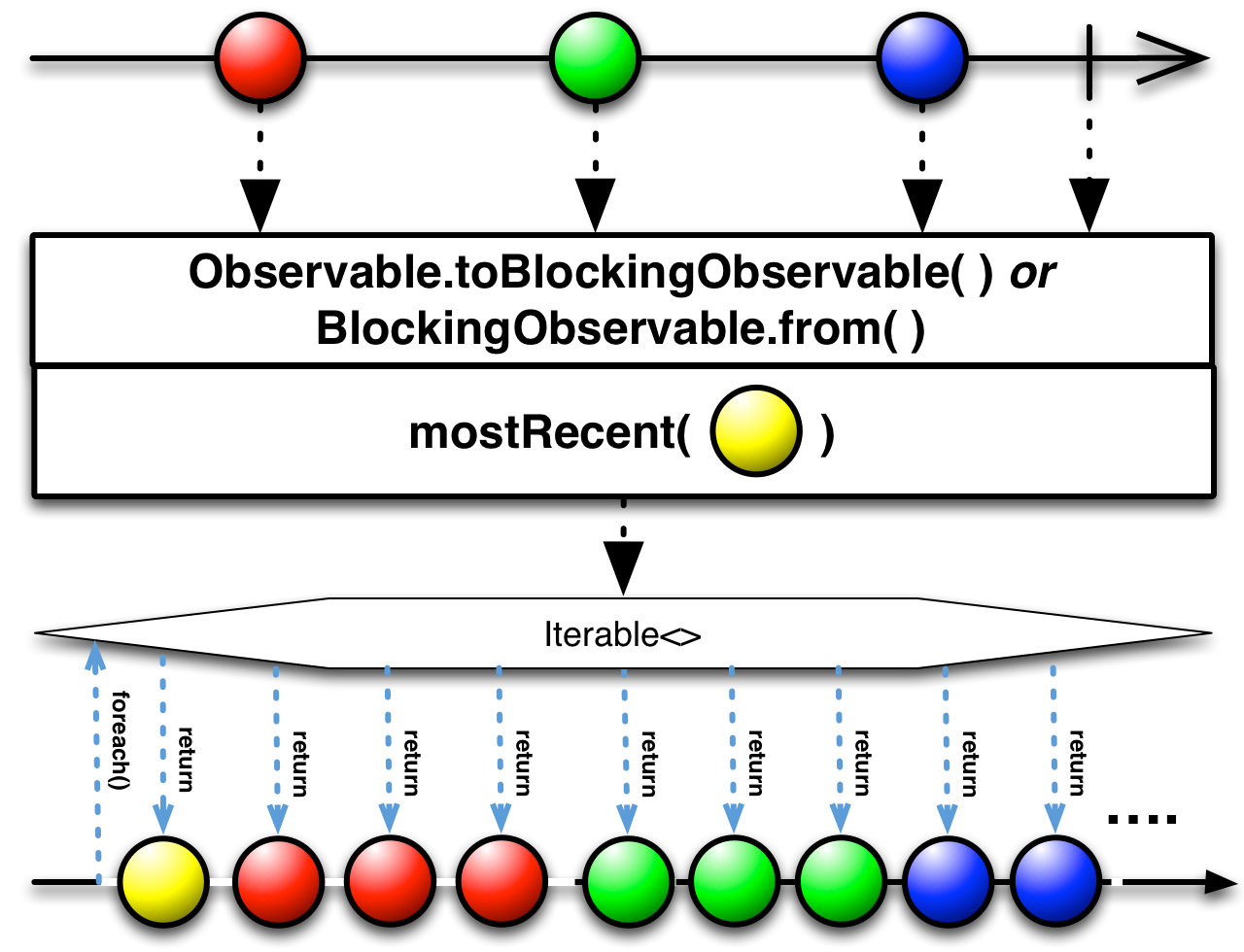 The
The mostRecent() method returns an iterable that on each iteration returns the item that was most recently emitted by the underlying Observable (or null if the Observable has not yet emitted an item or has completed without emitting any).
- javadoc:
mostRecent(initialValue) - Linq:
MostRecent
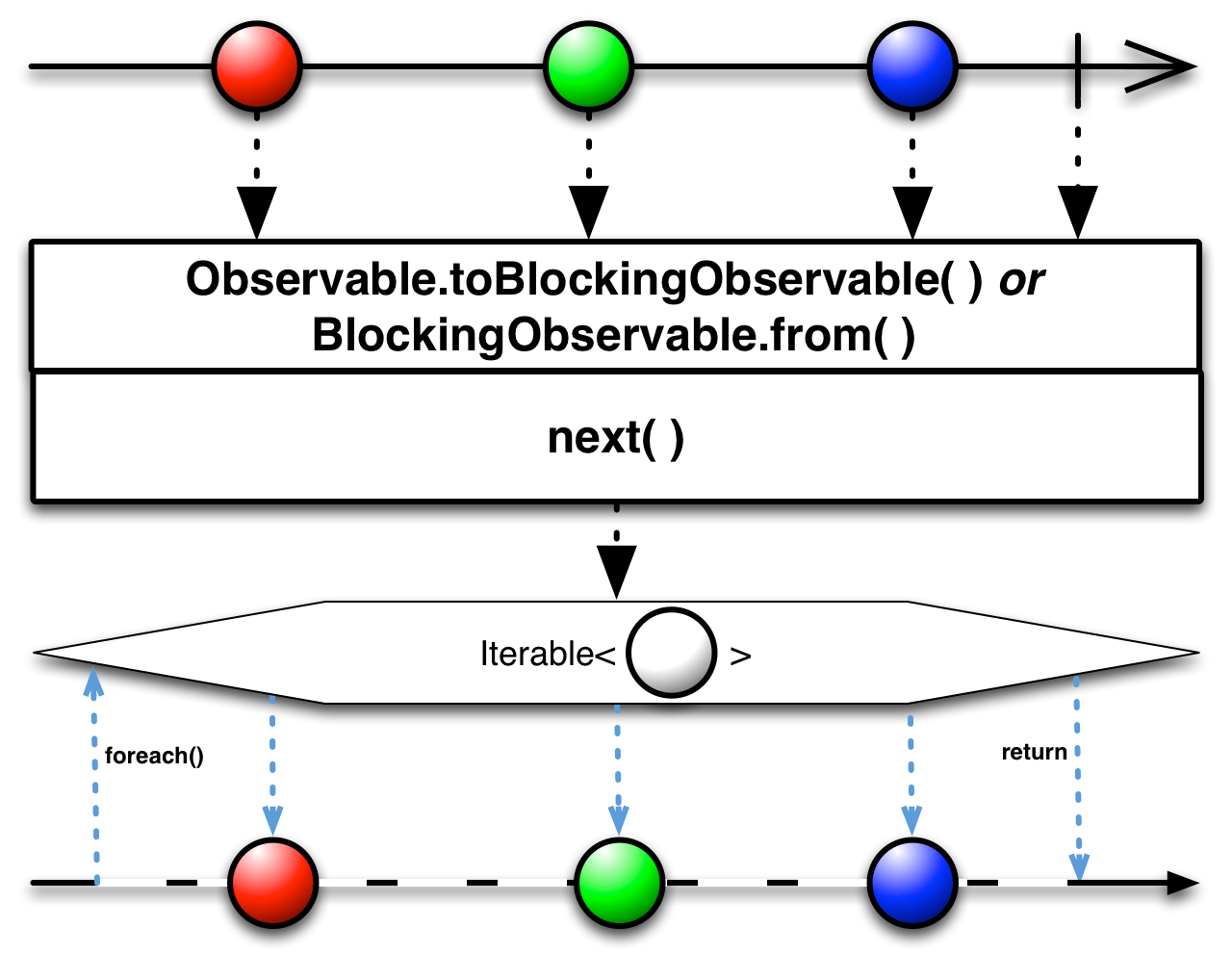 The
The next() method returns an iterable that on each iteration blocks until the underlying Observable emits another item, then returns that item (or null if the Observable finishes without emitting another item).
if the Observable completes after emitting a single item, return that item, otherwise throw an exception (or return a default item)
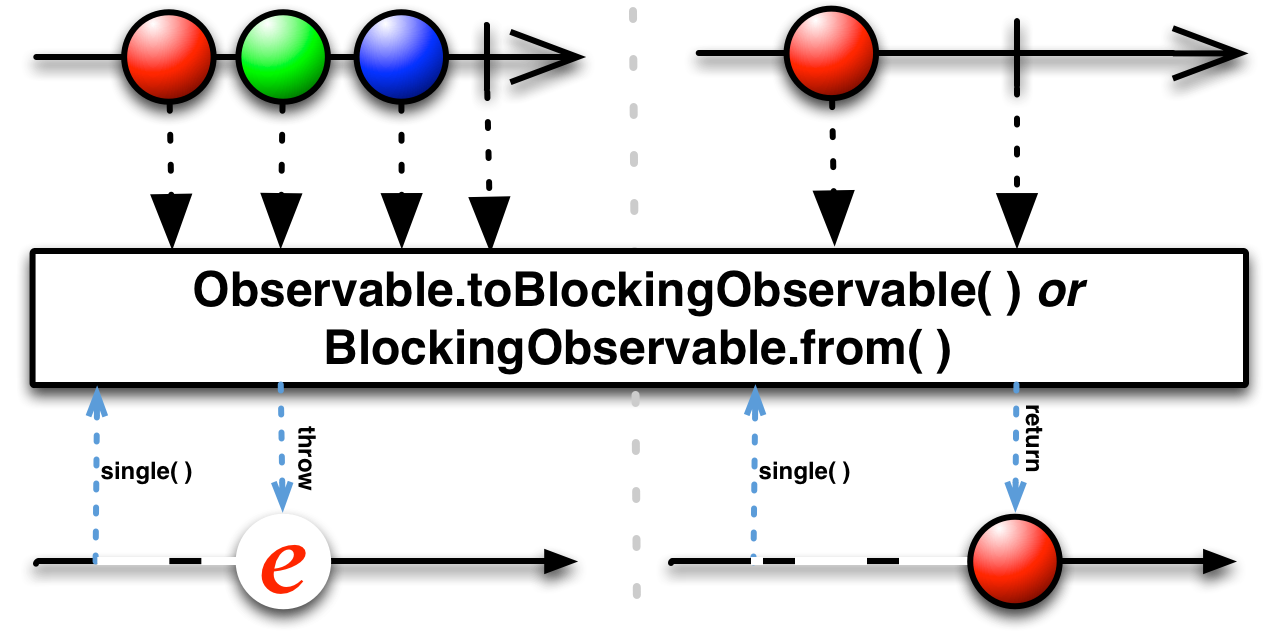 Use the
Use the single( ) method to retrieve the only item emitted by an Observable. single( ) will throw an exception if the Observable does not emit exactly one item.
You can also use this method to retrieve the only item emitted by an Observable that meets some particular condition (or null if the Observable method emits no such item). To do this, pass a function to single( ) that returns true if the item meets the condition. In such a case, single( ) will again throw an exception unless the Observable emits exactly one item that meets the condition.
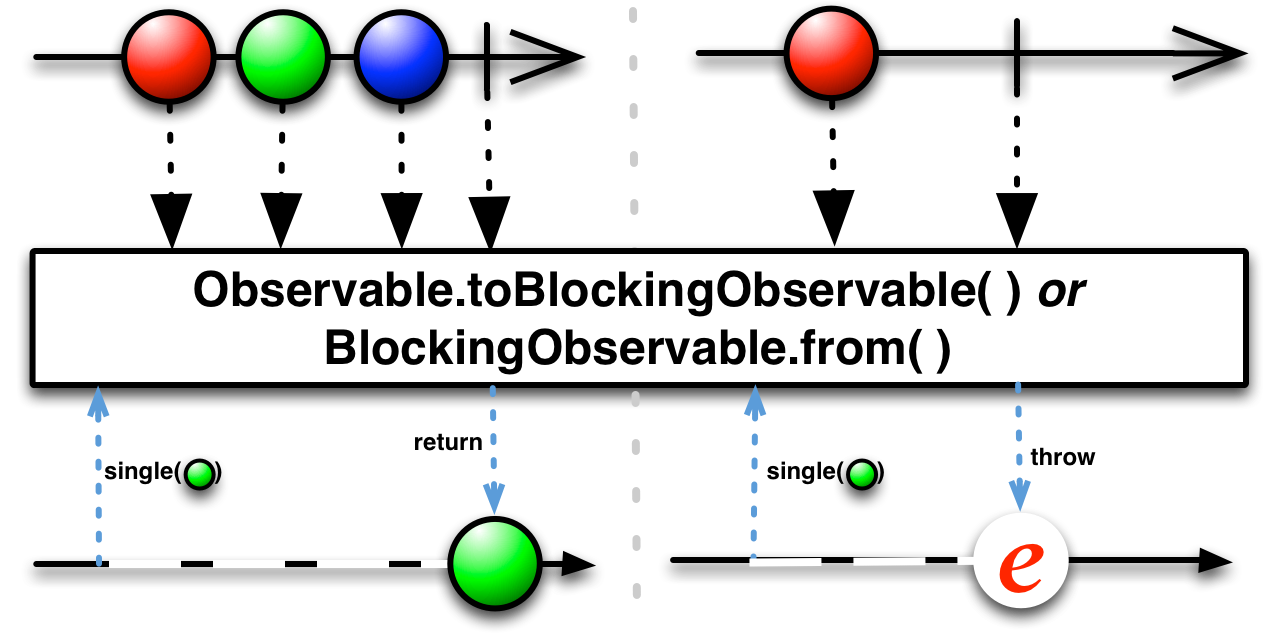
The singleOrDefault( ) method is similar, except that while it will still throw an exception if the underlying Observable emits more than one item, if the underlying Observable does not emit any items at all, rather than throwing an exception singleOrDefault( ) will return a default item that you specify. Specify that default item by passing it as the first parameter to singleOrDefault( ).


- javadoc:
single() - javadoc:
single(predicate) - javadoc:
singleOrDefault(default) - javadoc:
singleOrDefault(default, predicate) - RxJS:
single - RxJS:
singleOrDefault - Linq:
Single - Linq:
SingleOrDefault - Introduction to Rx: Single
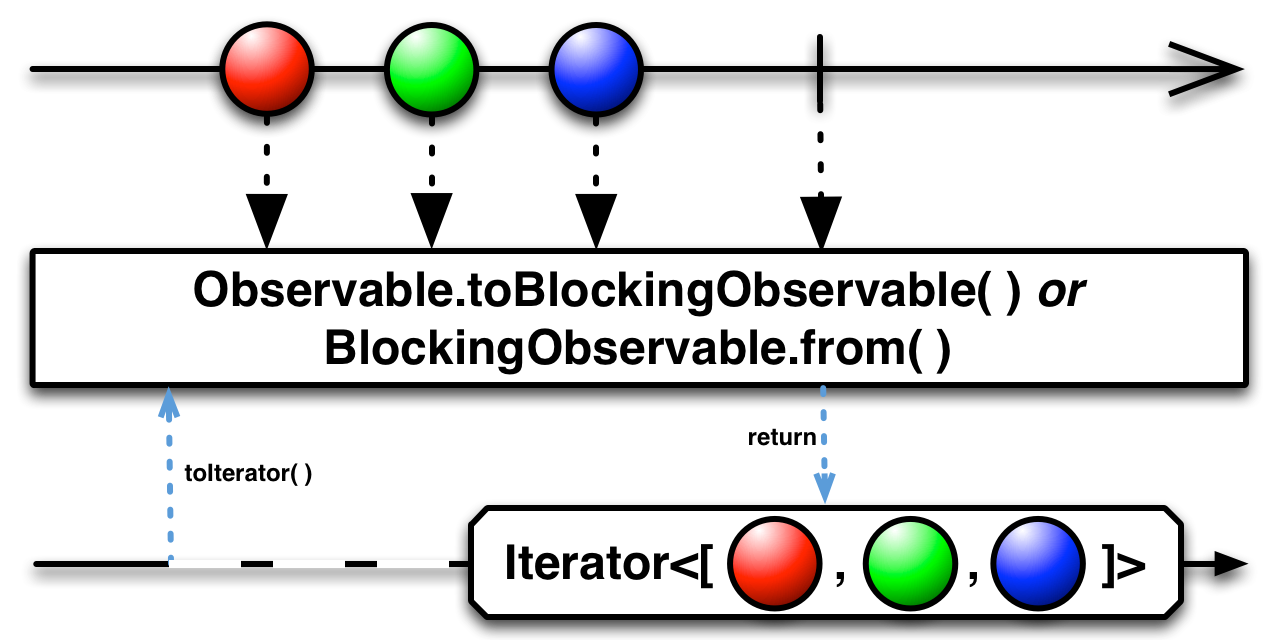


Use these methods to transform a Blocking Observable into a Future, an Iterable, or an Iterator. Note that toFuture( ) will only work on Blocking Observables that emit one or fewer items. To convert Blocking Observables that emit two or more items into Futures, instead use .toList( ).toFuture( ) to reduce the items emitted by the Observable to a single (list) item.
- javadoc:
toIterable() - javadoc:
toFuture() - javadoc:
getIterator() - Linq:
toEnumerable - Linq:
toEvent - Introduction to Rx: Leaving the monad
A Netflix Original Production
Tech Blog | Twitter @NetflixOSS | Twitter @RxJava | Jobs